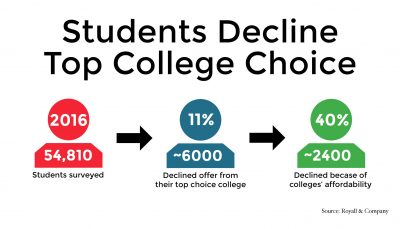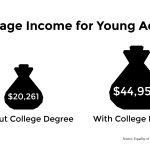
A recent economic study found that 40 percent of accepted students who decided not to go to their top choice universities cited reasons related to cost. The survey was released by Royall and Company, a private college economics research company, which surveyed more than 50,000 students who graduated from high school in 2016.
This data shows that 18.6 percent of students surveyed turned down their top school because they felt they couldn’t afford it. Other top reasons include campus environment, school location and academic reputation.
Boston University is ranked by CBS News as one of the top 50 most expensive colleges in the country. As a private university, it ranks among Massachusetts colleges such as Tufts University and Amherst College in overall student tuition. Recently, BU announced a 3.4 percent increase in tuition for the 2017-2018 school year, The Daily Free Press reported.
Raul Fernandez, a lecturer in Boston University’s School of Education, wrote in an email that actions should be taken to keep costs from getting in the way of education.
“It’s unjust that students who’ve worked hard and met the standards of admission for their institution of choice cannot afford to go there,” Fernandez wrote. “Stats like these remind us that higher education is not a pure meritocracy, and it never has been. As it stands, there is currently no law or statute making access to college a right for all regardless of family income, but there should be.”
BU spokesperson Colin Riley said the result of the study does not surprise him. He said, however, BU faces difficulties in keeping down costs as a private university.
“I know BU works very hard to address affordability and accessibility,” Riley said. “Yet we are a tuition-dependent school, and half of our revenue is tuition.”
Several BU students, when asked about the study, said they are also unsurprised. Most spoke about their own difficulties with affording college tuition and accessing financial aid.
Ann-Lyssa Asare, a freshman in the College of Arts and Sciences, said she made the decision to go to BU after receiving financial aid, but was frustrated when that aid was revoked.
“Originally, one of my top schools was [New York University], and I didn’t pick it because they don’t really provide financial aid,” Asare said. “So BU was also in my top choices and it was not as expensive, but after I turned in my tax forms, it was like I was paying the full thing.
Misbah Khan, a senior in the Questrom School of Business, expressed frustration with the tuition increase, and said it would have impacted her decision-making four years ago.
“I have a problem with the tuition increase,” Khan said. “Now I think it’s like $70,000 a year and they keep increasing it. If I had known that BU would increase its tuition every year, I wouldn’t be here.”
Amber Walsh, a senior in the School of Education, said she herself admittedly can not afford BU.
“Despite receiving a need [and] merit-based grant that gives me more than half off tuition and the twice a year written and verbal appeals I make to financial aid, I absolutely cannot afford to be here,” Walsh said. “I will be paying off my loans for the foreseeable future other than the significant portion the government will pay if I teach in certain schools for a long time. I have worked firsthand with plenty of high school students who have the grades and the drive to attend a school like BU and cannot because of financial reasons. It makes me upset because many of those students would thrive in this environment and they would never let an opportunity pass them by.”





I agree with Dr Fernandez that higher educational costs limits quality from attending fine institutions such as our alma mater. More and more, education is restricted only to the wealthy or those who are well off, essentially making it seem like a country club environment where only wealtly people can attend. How is that going to help our society? How is a school like Boston University going to positively impact our communities, our world when we are only enrolling young kids from the 1% or the likes?
Studies I have glanced over said that the major reasons many schools raise tuition is to maintain a football team, or a big interest sport that increases applications and boosters. We have no football team! It was also said that it was to attract top quality professors and staff. How is that working out? These are questions that need to be asked by alumni and disseminated by the Board of trustees and president Brown. We get constant calls, emails, mail of new buildings going up and expansion of existing buildings, and notices of grants and donations in record numbers yet tuition still goes up. Why?